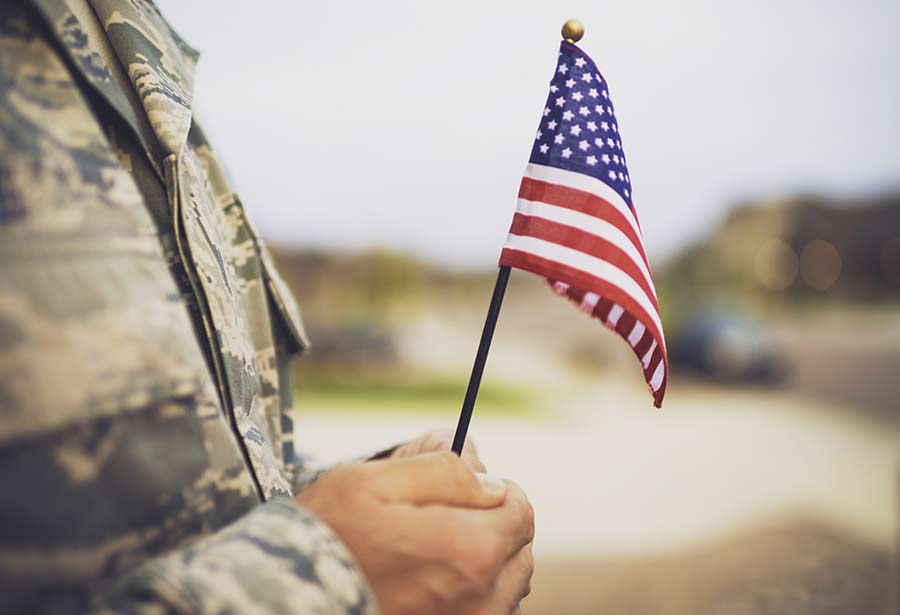Read the latest and greatest from our team
of incredible specialists.

Beach House Recovery Center » Blog » Rehab for Veterans: Things to Consider When Finding a Treatment Center
The popular image of a soldier (depending on whether you believe in the cause they’re fighting for) is either “fearless, tough, unyielding” or “brutal, insensitive, ruthless.” In either case, the picture is of someone almost superhuman, someone who never lets personal feelings interfere with following duty when it calls, someone hardly fazed by horrors that drive ordinary people to vomiting or worse. On the field of combat, with adrenaline flowing high and hard, perhaps there’s some truth in that image. But once the shouting and shooting die down—and especially once soldiers return to civilian life—the fierce combatant’s human weakness quickly surfaces. The “shell shock” suffered by World War I veterans, the culture shock and stigma met by soldiers returning from Vietnam, the post-traumatic stress disorder (PTSD) afflicting contemporary veterans—all tell the story.
Active and former military members weep at painful memories, meet challenges they weren’t prepared to cope with, and suffer every sort of pain. Too often, they take the addiction-generating path of trying to kill that pain with drugs:
We’ve touched elsewhere in our Learning Center on wanting to enlist in the military if you have a past addiction or are under treatment. Here, we’ll talk about issues faced by people who became addicted during and after their military service.

After several years in the carefully ordered, high-alert military world, re-entering the more casually structured civilian world can mean major culture shock. The “following orders” approach to life doesn’t get a person far where independence and initiative are valued. Someone accustomed to giving orders may fare even worse in a society that considers it the height of rudeness to neglect “please” and “thank you.” And, of course, it can be hard to cope with a world of freely expressed and widely varying opinions (some just looking for a target to fire anti-military diatribes at) after being long surrounded by peers bound to a common cause.
The veteran who brings home a newly acquired disfigurement or disability faces an additional burden—and mental-behavioral problems also attract stigma and blame that only make it harder to cope. Often even those to whom the veteran was closest fail to understand. Painful as it is to have prayed every night for someone’s safe return, only to see them come back addicted, it stings worse than any shrapnel if you attack them with accusing words:
Whether or not things are that bad in your household, a veteran (like anyone else) with addiction disorder needs professional treatment as soon as possible. And veterans have extra treatment options to choose from.
Any U.S. Military veteran who has received an honorable discharge is eligible for treatment from the U.S. Department of Veterans Affairs (VA), which now has over one million patients with mental illness and/or substance abuse disorder. This is the best option for many, but not all, veterans. Points to consider:
Remember that VA coverage doesn’t automatically come with discharge: you have to personally enroll. It’s always a good idea to do so, but that doesn’t bind you to using VA services in every situation. Visit your nearest VA office, as well as a few conveniently located private-sector clinics, and see what sort of “feel” you get from the people and the atmosphere.
Whether you opt for government-funded or private-sector treatment, there are other things every veteran should know about finding an addiction treatment center for Veterans in Florida.
Recovering from addiction teaches you to, as they used to say in the Army, “Be All You Can Be.” Don’t wait another day to enlist in treatment. Please contact us today for more information.
SOURCES
American Addiction Centers. “Drug Rehab Guides for Addicted Veterans and Their Families.” Accessed May 22, 2018.
Beach House Center for Recovery. “Contact Us: Start Your New Life Today.” Accessed May 22, 2018.
Beach House Center for Recovery. “Dual Diagnosis Treatment.” Accessed May 22, 2018.
Beach House Center for Recovery. “Firefighter’s Substance Abuse Rehab Options: Understand Your Needs and How to Find Help.” Accessed May 22, 2018.
Beach House Center for Recovery. “Will Going to Drug Rehab Affect Your Chances of Joining the Military?” Accessed May 22, 2018.
Benefits.gov. “Veterans Alcohol and Drug Dependence Rehabilitation Program.” Accessed May 22, 2018.
Matthews, Joseph L. “Who Qualifies for VA Medical Benefits?” Caring.com, May 21, 2018. Accessed May 22, 2018.
National Veterans Foundation. “What Statistics Show About Veteran Substance Abuse and Why Proper Treatment Is Important.” March 30, 2016. Accessed May 22, 2018.
Tagliareni, Sonia. “Veterans and Addiction.” DrugRehab.com, May 21, 2018. Accessed May 22, 2018.
U.S. Department of Veterans Affairs. “Locations: Veterans Health Administration.” Accessed May 22, 2018.
U.S. Department of Veterans Affairs. “PTSD: National Center for PTSD.” August 13, 2015. Accessed May 22, 2018.
U.S. Department of Veterans Affairs. “Summary of VA Treatment Programs for Substance Use Problems.” Accessed May 22, 2018.
Whether you’re researching for yourself or a loved one, Beach House can help. We understand that this is a serious time in your life and that the treatment center you choose matters. We want you to feel comfortable and empowered to make the right decision for yourself, a friend, or a family member. This is why a counselor is waiting and available to answer your questions and help put your mind at ease regarding the next steps. Many of the staff at Beach House have walked in your shoes. If you feel you’re ready or want more information about how to help a loved one, we can help today. You can also learn why we are voted the #1 rehab for addiction treatment in Florida.
We accept most major insurance plans and can verify your benefits quickly and confidentially.
We’re committed to helping you access the care you need, our admissions counselors can guide you through your coverage options and available resources.





"*" indicates required fields